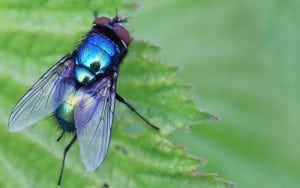Insect-plant relationships: insights into biodiversity and new applications (FlyHigh)
Phytophagou s and saprophagous hoverflies, blowflies and soldier flies occur worldwide and are diverse and important ecological groups in both natural ecosystems and agricultural environments, as pollinators of plants and as decomposers of organic waste. The phytophagous fly maggots (larvae) develop in living plants while saprophagous maggots utilize a wide range of decaying organic materials (like animal manure or vegetal wastes). Ecological data is available for some European groups of flies, while the biology of the South African fly fauna remain less explored. The project collected taxonomic and ecological data on South African flies and their host plants (specific bulbous plants such as lilies or aloe succulent plants), and tested if this data could be utilized in artificial rearing protocols of the new industrial-productive sector of flies and other insects.
s and saprophagous hoverflies, blowflies and soldier flies occur worldwide and are diverse and important ecological groups in both natural ecosystems and agricultural environments, as pollinators of plants and as decomposers of organic waste. The phytophagous fly maggots (larvae) develop in living plants while saprophagous maggots utilize a wide range of decaying organic materials (like animal manure or vegetal wastes). Ecological data is available for some European groups of flies, while the biology of the South African fly fauna remain less explored. The project collected taxonomic and ecological data on South African flies and their host plants (specific bulbous plants such as lilies or aloe succulent plants), and tested if this data could be utilized in artificial rearing protocols of the new industrial-productive sector of flies and other insects.
Artificial rearing of flies produces beneficial endproducts, the flies themselves or their larval stages that could be applied for different services as animal feeding, valorisation of agri-food by-products or as bio-agents for e.g. complementary pollination services in natural or greenhouse environments. The FlyHigh project explored ways to improve controlled rearing protocols for fly mass rearing including optimal ranges for different rearing parameters of e.g. temperature, humidity, diet and density. We used the black soldier fly (Hermetia illucens) and other species less commonly used in artificial rearing so far; Musca domestica and Lucilia sericata. New larval feeding media were developed, and comparisons of capacities of different strains of flies (wild, vs “domestic” and comparing different geographic origins) have been tested. The societal importance is gained from the enhanced rearing protocols enhancing maggot activity and producing flies more effectively and sustainably in artificial rearings.
Funded by the EU Horizon 2020 Marie Skłodowska-Curie actions, Research and Innovation Staff Exchange Programme, one of the main aims of the project was to facilitate cross-sectorial transfer of knowledge and training of researchers as well as technical staff. The active exchange programme involved researchers, students, laboratory and technical staff of scientific collections from Finland (University of Helsinki), Spain (University of Alicante, company Bioflytech), Serbia (University of Novi Sad), and South Africa (company Agriprotein). The successful training and transfer of knowledge was carried out by circa 100 months of visits, training courses, organized fieldwork, and scientific seminars. The participants also collaborated intensively in carrying out molecular analyses and writing scientific articles, and with dissemination of results in scientific congresses, public presentations and in media through several press releases in different languages and interviews of participants.


